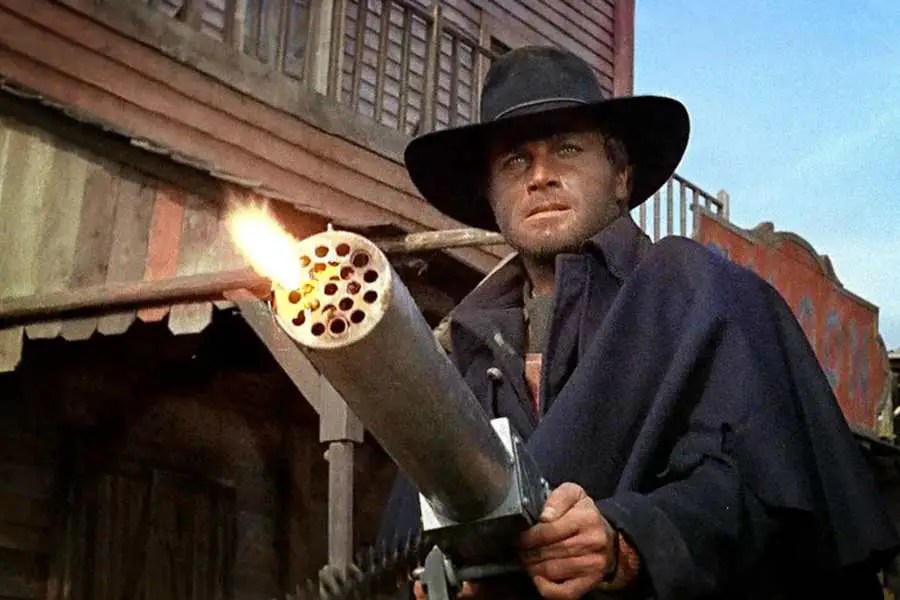The trail one is supposed to tread is drenched in mud—the sort that seeps as much as your boots and pulls in your legs, attempting to swallow you complete into an unforgiving, primordial abyss. A lone man walks ahead, dragging an ominous coffin behind him; every step seems like a mile, the load of the burden nearly an excessive amount of to bear. Nonetheless, he presses on. And then, by the haunting echo of an iconic rating, we hear his identify: Django. However this Django will not be Tarantino’s liberated avenger. This Django hails from 1966, and he’s no much less iconic. Watch the movie’s opening moments and also you’ll perceive why this character—and this movie—commands a cult following. You could even end up drawn to its grim, magnetic spell.
Sergio Corbucci’s Django (1966) is among the many most interesting Spaghetti Westerns by no means to function Clint Eastwood. It celebrates and subverts the style’s conventions whereas marking a breakthrough efficiency for Franco Nero. The movie’s opening is sort of biblical in tone—imbued with thriller, menace, and an odd, rugged grace.
Django doesn’t draw back political undercurrents. The lingering wounds of the Civil Conflict—particularly, the Union-Accomplice divide—are by no means explicitly said, but their presence is palpable. Corbucci’s brilliance lies in implication, not exposition. The trauma of that nationwide battle ripples by each body, shaping the lives of the characters in refined, irreversible methods. This restraint spares the movie from descending into didacticism, a lure that has marred many in any other case formidable works.
We meet Maria, the feminine lead, as she is being whipped on a bridge by a Mexican gang. Rescued shortly after by the henchmen of Main Jackson, a sadistic ex-Accomplice officer, Maria briefly appears secure—till the movie reveals its true nature. Django will not be a story of rescue. It’s a story of brutal survival. Jackson’s males quickly try and burn Maria on a cross. Enter Django, a drifter who storms in and dispatches the tormentors with a swagger Eastwood himself could be pleased with.
The movie’s central metaphor is powerfully laid naked, with the later ghost city episodes serving as pure extensions of that very same bleak imaginative and prescient. That is no John Ford frontier; it’s harsher and extra brutal. The violence—gritty, unapologetic—seemingly paved the best way for Tarantino’s Django Unchained. The plot, if it exists in any respect, is threadbare. At instances, the characters’ motives are unclear. However that is by no means a demerit to the film. Life doesn’t all the time include clear outlines. The story dangles by a shoelace, and that’s exactly the purpose. Corbucci takes the “Man with No Title” archetype and stretches it into one thing even bleaker. Franco Nero’s distant, impassive efficiency has drawn its share of critique. However actually, how a lot heat survives in a world so ruthless? He appears to be like exhausted, fractured—like a person eroded by the very soil he walks.
Django confidently blends genres. Gothic horror parts—ghost cities, gallows, and crucifixions—infuse the Western framework with an eerie melancholy. These tonal shifts will not be jarring however seamless, revealing a filmmaker in full management of his craft.
The usage of violence is especially daring. In 1966, solely low-budget exploitation movies dared present such gore. However Corbucci’s violence will not be sensational—it’s unflinchingly actual. And that realism dramatically ups the stakes, preserving us on edge all through.
And but, Django by no means feels gratuitously violent. It’s true to the period it portrays—a world the place brutality was survival. Corbucci doesn’t sanitize his imaginative and prescient for broader enchantment. He stays trustworthy to his theme: an America not but civilized, however scarred and unresolved.
It’s no shock Quentin Tarantino was so enthralled by this movie. So have been dozens of different administrators, although few matched Corbucci’s audacity. Tarantino’s Django Unchained ideas its hat to this legacy most memorably in a quick scene the place Jamie Foxx meets Franco Nero. When Nero’s character asks Foxx’s Django for his identify and receives the reply, Nero pauses and says, “I do know.” A easy second. A profound tribute.
However Django is not any story of redemption. In one in all its most poetic ironies, our gunslinger has his fingers smashed by horses. He’s unable to fireplace a gun, however nonetheless compelled to struggle. A person made for violence, disadvantaged of the very instrument that defines him. It’s a tragedy masked as a Western and soaked in blood. And when the over-the-top Gatling gun fires, mowing down dozens, it doesn’t really feel absurd—it feels inevitable. As a result of in Corbucci’s world, everyone seems to be caught within the crossfire.
A lot of the movie’s legacy stems from the circumstances during which it was created. Django was a danger. A shoestring-budget spaghetti Western shot in Italy, it operated with extra grit than cash. It was an indie in spirit, if not in distribution.
And but, it spawned a wave of imitators—as many as 30 to 50 so-called “sequels,” many unrelated in plot however branded with the Django identify by opportunistic distributors. The mythos grew not by loyal audiences however by unchecked replication.
Nonetheless, Django earns its pedestal. It’s not legendary due to advertising. It’s legendary because it changed the style.
When you haven’t seen it, watch it. However don’t decide it by its trailer. It’s tacky, chaotic, and wildly deceptive. In these days, trailers have been afterthoughts, not cinematic teases.
Total, Django is crucial viewing for any fan of the Western. It seamlessly weaves political commentary with operatic violence and atmospheric dread. With a 7.3 score on IMDb and a well-earned 92% on Rotten Tomatoes, Django stays a compelling journey by an ethical wasteland.
The pacing surprises—fluid the place it ought to slog, jagged the place it ought to settle. So give it time. Give it consideration. Not the sort Predestination calls for, maybe, however focus nonetheless. As a result of in case you blink, you’ll miss one thing vital.
And lastly, once you press play, keep in mind what you’ve been instructed. The D is silent.
Score: 3.5/5
The place to Watch: Prime Video
[Originally written by Deepjyoti Roy in 2019. This version was revised and updated by Mitch Farrell in July 2025]










